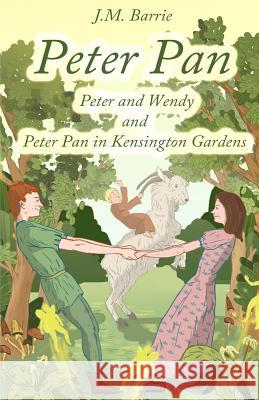Peter Pan: Peter and Wendy and Peter Pan in Kensington Gardens » książka
topmenu
Peter Pan: Peter and Wendy and Peter Pan in Kensington Gardens
ISBN-13: 9781497469112 / Angielski / Miękka / 2014 / 282 str.
Peter Pan
1. Peter and Wendy2.Peter Pan in Kensington Gardens "Dreams do come true, if only we wish hard enough. You can have anything in life if you will sacrifice everything else for it."
J.M. Barrie, Peter Pan Peter Pan, or The Boy Who Wouldn't Grow Up and Peter and Wendy are the stage play and novel (respectively) which tell the well-known story of Peter Pan, a mischievous little boy who spends his never-ending childhood on the island of Neverland, and his adventure with the ordinary girl Wendy Darling and her brothers. The story was written by Scottish playwright and novelist J. M. Barrie (1860-1937). It features many fantastical elements, including children who can fly, a magical fairy, and mermaids. It was first staged at the Duke of York's Theatre on 27 December 1904, then adapted by Barrie into a novel published in 1911, and since adapted numerous times for film and other media, remaining popular with generations of children and adults. The story of Peter Pan has been a popular one for adaptation into other media. The story and its characters have been used as the basis for a number of motion pictures (live action and animated), stage musicals, television programs, a ballet, and ancillary media and merchandise. The best known of these are the 1953 animated feature film produced by Disney featuring the voice of 15-year-old film actor Bobby Driscoll (one of the first male actors in the title role, which was traditionally played by women); the series of musical productions (and their televised presentations) starring Mary Martin, Sandy Duncan, and Cathy Rigby; and the 2003 live-action feature film produced by P. J. Hogan starring Jeremy Sumpter. There have been several additions to Peter Pan's story, including the authorised sequel novel Peter Pan in Scarlet, and the high-profile sequel films Return to Never Land and Hook. Various characters from the story have appeared in other places, especially Tinker Bell as a mascot and character of Disney. The characters are in the public domain in some jurisdictions, leading to unauthorised extensions to the mythos and uses of the characters. Some of these have been controversial, such as a series of prequels by Dave Barry and Ridley Pearson, and Lost Girls, a sexually explicit graphic novel by Alan Moore and Melinda Gebbie, featuring Wendy Darling and the heroines of The Wonderful Wizard of Oz and Alice's Adventures in Wonderland.
Zawartość książki może nie spełniać oczekiwań – reklamacje nie obejmują treści, która mogła nie być redakcyjnie ani merytorycznie opracowana.











